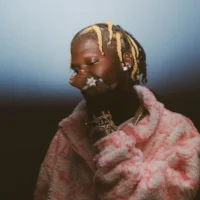DJ Ice-Cream is a Nigeria-born, China-based disc jockey making impact in a culture totally different from his nativity.
The graduate of International Economics and Trade from Bohai University, Liaoning Province in Jinzhou, China, spoke to ADEDAMOLA EDUN on how he went from being regarded as a total outsider to becoming the loved “ice cream man” of China town.
Despite living out most of his career life quite easy in the Far East, Ojo Kolade James grew up in Lagos, Nigeria with quite a troubled childhood. Coming from a polygamous home, and then losing his mother (who was his father’s second wife) as a ten-year-old in 1997 signaled a period of a not-so-easy life. The well-traveled DJ who has visited places like Singapore due to the popularity of Electro and Hip-Hop music in that part of the world describes his growing from that childhood period as “hell”.
“Of my mother’s 9 children, I am the 7th. I have 3 elder bothers, 3 elder sisters, and 2 younger brothers after me,” he reflected. “After mom passed, my aunt (mom’s younger sister) promised to take care of me so she took me in to her place. Back then she had a restaurant where she sold different kinds of food so she would typically start my day with waking me up at 4am to fetch water from the well, wash the dishes and clean up the surroundings.
And before I head to school later in the morning, I would have to sell rice and beans. When I come back home from school, I’d sell pounded yam. This went on for a while before some family members found out and reported to my dad.”
Asked if any other member of his extended family ever reached out to help, he revealed: “Yes, I had an uncle who worked in the CBN who normally came home and gave my aunt money on a monthly basis for taking care of me, but she never gave me 1 kobo of it.” His father would later take him back home due to apparent reports of his maltreatment by the aunt. “I went to stay with him till I finished my secondary school,” he continued, “after which I moved to Lagos in 2002. So while back with my dad, I had time to go to church and join the youth choir where I sang and played drums.”
On how he took up威而鋼
the DJ trade, he recalled how he learnt from a friend’s brother who was a deejay in Lagos. “Whenever there’s a birthday party or other events, I go with him to assist him. If he’s going to eat or drink, he would tell me to stay and watch the equipment set for him and that I shouldn’t touch anything. So one time I told him I was interested in learning how to deejay. He said firstly I have to learn the beats, and I started to learn from him. Soon I got my skills up a bit, and then moved to Abuja in 2005 because I had a brother there. When I got there, my brother asked me what I would do to make money. I told him about my plans to become a DJ. There was a club at Wuse Zone 4 where I used to go with some friends.
One day I asked the in-house DJ to give me a chance to play. He put me on the wheels for just about 20 to 30 minutes, and facing so many people for the first time, I was extremely nervous. After that I went on to a play as a DJ at a wedding in Jos, where I had no instruments and had to rent everything I used. During this period I lived and worked in Nassarawa, Jos and Abuja till I got a study offer in Sweden 2008. But I was denied visa, so I turned to a brother of mine in China who also sent me student invitation letter around 5 to 6 times before I finally got a visa in 2010.”
Moving to another part of the world and opening up to a whole different culture did well to open up DJ Ice-Cream’s horizon and steadily developing career, and even the oddity of his moniker became a curious topic for which we mirthfully demanded an explanation. How did a whole adult come to be referred to as a dessert snack? “Well, when I arrived in China in 2011, I immediately sought out deejay gigs and adopted the moniker DJ Nicholas, but it was too difficult for my Chinese folks to pronounce, so I had to choose something unique and easy,” he elaborated. “I happened to eat ice cream a lot at that time, so my housemate ZeeGee, who is also a Nigerian from Kaduna, jokingly suggested that I change my moniker to DJ Ice-Cream because of that. The following day I went to work, and when they asked me what my name is, I said ‘DJ Ice-Cream’, and they just started laughing. At first I was confused as to if these people still don’t understand the name or, if they don’t like it. So I asked the club manager and he said they found it so funny that they like it. From then, at each club I worked, pool party, event and birthday party, I would be introduced as ‘DJ Ice-Cream’”.
But the change in environment came with its own challenges nonetheless. He initially found it difficult combining study and my DJ’ing work because, he said, “in China a student must not work as it is against the law there. But because I understand their language very well and I have a lot of Chinese friends, I was able to get by. I speak Chinese and can write a little bit.”
Having put in considerable years into his craft on the wheels, he shared his working experiences for the benefit of younger ones who would be looking to get in the same game he already honed his skills in. “Great technique means nothing if your music selection is not on point, or at least personal. I see this situation a lot in the business. As a listener I only want to hear great music. For me it’s best when DJ’s play is personal. As a DJ, play only music you love or feel, or it will be a tough, short journey. If you love it, they (the listeners) will feel that love in the mix. You should be booked on what and how you play, not on what the crowd wants to hear.”
Further shedding lights on the DJ business, he detailed more on equipping and learning: “The cost of becoming a deejay and the amount of skills needed are now so low that pretty much anyone can do it, but I do think that there’s one huge factor that has affected DJ’ing and that’s the cost of being able to become a good DJ. And when I say cost, I mean that in terms of time invested as well as money.
A few years back, to deejay, you have to save up money to buy two decks, an amp, speakers, and a mixer and so on. These alone could cost you maybe $1,800 or so, often more.
You had to have these things at home or have access to them at least, because you have to practice your mixing so you wouldn’t get laughed out of the club, if someone ever lets you play. You also had to invest time and money into traveling to wherever your local record shop is at and buy records at the rate of around $7 to $8.
There was no free downloads in the pre-internet era so that amount could mean a huge expense as well. You also had to invest time into learning how to mix two records together – no sync, no laptops, just an endless trial and error process.
And eventually, after a lot of practice you hopefully get the hang of it. You use what you have, you create with that, you are an artist. The moment you worry about others in this regard you become a shadow, an empty vessel. Some DJs copy the exact setup of others when not using decks, and create a pastiche, a weak version of a photocopy. Good DJs don’t care about anything except principle; and they are the ones I respect. Whether I like their music or not is immaterial in this regard.”
Living so far away from home has not dampened his love for Nigerian music nor decreased his level of information on happenings in Nigeria and the rest of the world. He names popular deejays DJ Jimmy Jatt, DJ Xclusive, DJ Spinall, DJ Cuppy, DJ Neptune, DJ Caise, DJ Larry, DJ Khaled, DJ Drama and DJ Asto as his current favorites. He also hints on collaborative projects with popular Nigerian acts, though he declines to reveal names. “Yes, I am working on something big with a big artist in Nigeria,” he said of his future plans. “I also plan to visit many more places in Europe, Canada and the US. I’d like to go there to play soon.”











